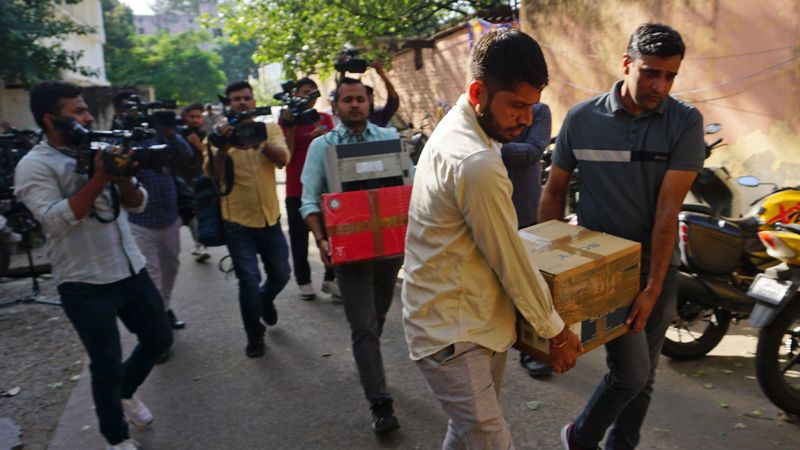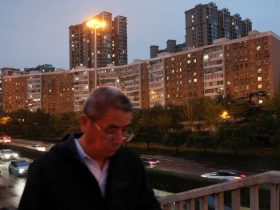Police in New Delhi have raided the homes of prominent journalists linked to a left-leaning news organization known for its scrutiny of the Indian government, part of an investigation using a sweeping anti-terror law, in a move media groups called an attack on press freedoms.
Forty-six people have been questioned and digital devices and documents seized for examination, Delhi police said in a short statement following the raid on Tuesday.
Those questioned include reporters, editors and contributors linked to NewsClick, an independent news website known for being fiercely critical of Prime Minister Narendra Modi’s government.
Police said they had arrested the outlet’s founder and editor, Prabir Purkayastha, and a colleague, Amit Chakravarty, and an investigation is under way in connection with India’s Unlawful Activities (Prevention) Act, or UAPA, an anti-terror law that critics describe as “draconian” and makes it nearly impossible to receive bail.
Some of those taken for questioning reported the raids on Twitter, now known as X, as they were taking place.
In one last post before her devices were taken, writer and activist Bhasha Singh wrote: “Finally last tweet from this phone. Delhi police seizure (sic) my phone.”
At 8.05 a.m. local time, journalist Abhisar Sharma said Delhi police were at his home and about to take his devices.
Hours later, he added: “After a day-long interrogation by Delhi Special Cell, I am back home. Each and every question posed will be answered. Nothing to fear. And I will keep questioning people in power and particularly those who are afraid of simple questions.”
The raids have shaken and angered India’s independent media, who say Modi and his right-wing Bharatiya Janata Party (BJP) are tightening their grip on press freedom.
CNN has reached out to the BJP for comment.
Speaking at an event in Odisha on Tuesday, Minister of Information and Broadcast Anurag Thakur said he didn’t need to justify the action from the police.
“If anyone has committed anything wrong, agencies are free to carry out investigations against them under set guidelines,” he said.
India, with a population of 1.4 billion people, is the world’s largest democracy and one of the largest media markets in the world.
But the Modi administration has been repeatedly accused of intimidating the press, stifling free speech, and censoring independent news organizations.
In the annual World Press Freedom Index, published by Reporters Without Borders, India has dropped from 140th in 2014 – the year Modi came to power – to 161 out of 180 nations in this year’s list. That puts India below countries like Laos, the Philippines and neighboring Pakistan.
The Indian digital news foundation Digipub said it was “deeply concerned” by Tuesday’s raids.
“This has taken the government’s pattern of arbitrary and intimidatory behaviour to another level,” it said in a statement. “India has been in a downward spiral on press freedom and other rankings on civil liberties and human rights, and the Indian government’s war against the media is a blot on the world’s largest democracy.”
The Editor’s Guild of India said it was concerned that the raids were “yet another attempt to muzzle the media,” while urging the government to follow “due process” and “not create a general atmosphere of intimidation under the shadow of draconian laws.”
The Press Club of India said it stood in “solidarity with the journalists and demands the government to come out with details.”
Students, journalists and civil society groups have organized protests across Delhi on Wednesday to show solidarity with those questioned and arrested.
Debasish Roy Chowdhury, co-author of ‘To Kill A Democracy: India’s Passage To Despotism’, said with a few exceptions, India’s “national-level legacy mainstream media are at an advanced stage of state capture – television much more than print.”
He said raids such as the one carried out on Tuesday “are necessary only for the few remaining outposts of old-fashioned critiquing of the government that was not so long ago considered the natural duty of the media.”
“Nowadays, it’s seen as unpatriotic to ‘spread negativity,’ so news has to be about the good things the government is doing, overcoming the obstructions of its detractors who don’t want it to succeed,” he told CNN “Since the government is unquestionably nationalistic, any critique of the government is what they call an ‘antinational’ act.”
Tuesday’s crackdown comes eight months after Indian tax authorities raided the BBC’s offices in New Delhi and Mumbai, after it aired a documentary critical of Modi’s role in deadly riots in 2002.
Offices of other independent outlets have been raided in the past, and international non-profit rights group Amnesty halted operations in 2020 after the “complete freezing” of its bank accounts by the Indian government.
Read the full article here











Leave a Reply